词汇和语法知识
语法词汇知识点总结大全

语法词汇知识点总结大全名词名词是指人、事物、地点、概念等的名称,包括具体名词和抽象名词。
在句子中,名词通常作为主语、宾语或表语。
名词的数名词有单数和复数两种形式,单数表示一个人或一个事物,复数表示多个人或多个事物。
在英语中,名词的复数形式通常在词尾加上-s或-es,例如:book(单数)→books(复数)、bus(单数)→buses(复数)。
名词的所有格名词的所有格表示名词所属关系,通常在名词后加上-apostrophe(’)和-s,例如:Tom’s book(汤姆的书)、the dog’s tail(狗的尾巴)。
名词的分类名词分为可数名词和不可数名词,可数名词可以用数量词来修饰,表示可以数清楚的事物,如:book(书)、dog(狗);不可数名词表示不能用数量词来修饰的事物,如:water (水)、money(钱)。
代词代词是用来代替名词的词语,分为人称代词、指示代词、疑问代词、不定代词、关系代词等。
人称代词人称代词用来表示说话人、听话人和与说话人、听话人相关的人或事物,包括主格和宾格两种形式,如:I(主格)→me(宾格)、he(主格)→him(宾格)。
指示代词指示代词用来指示特定的人或事物,分为近指示代词和远指示代词,如:this(这个)、that(那个)。
疑问代词疑问代词用来提问特定的人或事物,如:who(谁)、what(什么)。
不定代词不定代词用来代替不特定的人或事物,如:some(一些)、any(任何)。
关系代词用来引导定语从句,如:who(谁)、which(哪个)。
动词动词是表示动作、状态或行为的词语,包括实义动词和系动词。
动词分为一般现在时、一般过去时、一般将来时、现在进行时、过去进行时、将来进行时等时态和主动语态、被动语态等语态。
实义动词实义动词表示具体的行为或状态,如:eat(吃)、run(跑)。
系动词系动词用来连接主语和表语,表示主语所具有的状态或性质,如:be(是)、seem(似乎)。
初中英语语法与词汇知识点总结
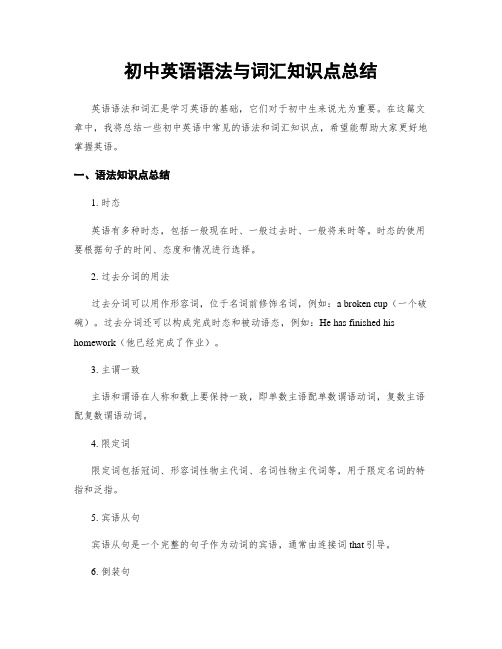
初中英语语法与词汇知识点总结英语语法和词汇是学习英语的基础,它们对于初中生来说尤为重要。
在这篇文章中,我将总结一些初中英语中常见的语法和词汇知识点,希望能帮助大家更好地掌握英语。
一、语法知识点总结1. 时态英语有多种时态,包括一般现在时、一般过去时、一般将来时等。
时态的使用要根据句子的时间、态度和情况进行选择。
2. 过去分词的用法过去分词可以用作形容词,位于名词前修饰名词,例如:a broken cup(一个破碗)。
过去分词还可以构成完成时态和被动语态,例如:He has finished his homework(他已经完成了作业)。
3. 主谓一致主语和谓语在人称和数上要保持一致,即单数主语配单数谓语动词,复数主语配复数谓语动词。
4. 限定词限定词包括冠词、形容词性物主代词、名词性物主代词等,用于限定名词的特指和泛指。
5. 宾语从句宾语从句是一个完整的句子作为动词的宾语,通常由连接词that引导。
6. 倒装句倒装句是一种特殊的语法结构,将谓语动词的全部或部分移到主语之前,通常用于强调句子的某个部分或表示问句。
7. 并列连词常见的并列连词有and、but、or等,用于连接同类型的词、词组或句子。
8. 条件句条件句用于表示假设、条件或可能性,有三种类型:一般条件句、虚拟条件句和非真实条件句。
二、词汇知识点总结1. 动词动词是英语中的重要词类之一,表示动作、状态或存在的词。
常见的动词有run、jump、eat等。
2. 名词名词是表示人、事物、地点或抽象概念的词,可分为可数名词和不可数名词。
常见的名词有cat、desk、love等。
3. 形容词形容词用于修饰名词或代词,表示人或事物的性质、特征或状态。
常见的形容词有beautiful、happy、tall等。
4. 副词副词用于修饰动词、形容词、副词或整个句子,表示时间、地点、方式、程度等。
常见的副词有slowly、quietly、well等。
5. 介词介词用于连接名词或代词与其他词语,表示关系、位置、方向等。
专升本英语语法与词汇知识点总结

专升本英语语法与词汇知识点总结在专升本的英语考试中,语法和词汇是两个至关重要的部分。
掌握好这两方面的知识,对于提升英语成绩和语言运用能力有着举足轻重的作用。
下面,我将为大家详细总结专升本英语中常见的语法和词汇知识点。
一、语法知识点(一)动词时态1、一般现在时表示经常发生的动作、存在的状态或客观真理。
其构成是主语+动词原形(当主语是第三人称单数时,动词要加“s”或“es”)。
例如:“He often goes to school by bike”2、一般过去时表示过去发生的动作或存在的状态。
构成是主语+动词的过去式。
如:“I played basketball yesterday”3、现在进行时表示正在进行的动作。
其结构是“主语+ be 动词+动词的现在分词”。
比如:“They are watching TV now”4、过去进行时强调过去某个时间正在进行的动作,形式为“主语+ was/were +动词的现在分词”。
像:“I was reading a book at that time”5、现在完成时表示过去发生的动作对现在造成的影响或结果,或者从过去开始一直持续到现在的动作。
其构成是“主语+ have/has +过去分词”。
例如:“She has learned English for five years”6、过去完成时表示过去某个时间之前已经完成的动作,结构是“主语+ had +过去分词”。
比如:“By the end of last year, we had learned 2000 words”(二)语态1、主动语态主语是动作的执行者。
例如:“He opened the door”2、被动语态主语是动作的承受者,构成是“be +过去分词”。
如:“The door was opened by him”(三)非谓语动词1、动词不定式具有名词、形容词和副词的特征,可作主语、宾语、定语、状语等。
词汇与语法

宾语:句子中表示动作、行 为的对象或结果的部分
补语:句子中补充说明宾语 或主语的部分,通常表示动
作的方式、时间、地点等
状语:修饰动词、形容词或整个句子的成分,表示时间、地点、方式等 定语:修饰名词或代词,表示品质、特征、所属等 状语和定语在句子中起到描述和限定的作用 正确使用状语和定语可以提高语言表达的准确性和丰富性
主语、谓语、宾语是句子的主要成分 定语、状语、补语是句子的次要成分 句子成分的顺序是主语、谓语、宾语,然后是定语、状语、补语 句子成分的顺序是遵循一定的规则和习惯的
并列复合句:由两个或两个以上的简单句并列组成,表达相对独立的含义。 主从复合句:由一个主句和一个或多个从句组成,从句在句中充当主句的一个成分。 嵌套复合句:一个复合句中包含另一个复合句,形成嵌套结构。 包孕复合句:一个复合句包含另一个简单句,形成包孕结构。
练习建议:多阅读,多写作, 提高语言运用能力
缺少主语或 谓语
句子成分多 余或残缺
语序不当 句式杂糅
词汇选择:根据语境选择合适 的词汇,表达准确含义
语法结构:运用正确的语法结 构,使句子通顺流畅
词汇丰富度:使用多样化的词 汇,增加语言表达的丰富性
语法准确性:确保语法正确, 避免产生歧义或误解
理解句子含义:通过词汇和语法 的组合,理解句子的具体含义。
添加标题 添加标题 添加标题 添加标题
定义:主语和谓语在人称、数、格等方面不一致的语法错误。
常见类型:主语是复数形式,谓语却是单数形式;主语是单数形式,谓 语却是复数形式。
纠正方法:检查主谓是否一致,确保在语法和语义上都符合规范。
示例:正确的句子:“The books are on the shelf.”(书在架子上。) 错误的句子:“The book is on the shelf.”(书在架子上。)
英语学习应该注重语法还是词汇?

英语学习应该注重语法还是词汇?语法与词汇:英语学习的“双引擎”英语学习,犹如驾驶一辆汽车,必须双引擎并举,方能高效向前行驶。
这“双引擎”,便是语法与词汇。
词汇是语言的基石,而语法是语言的框架。
词汇犹如砖块,组成了语言的最小单位,是传递信息的根本。
十分丰富的词汇量,意味着更精准的表达,更深入的理解。
语法则如同建筑蓝图,将词汇排列组合,形成完整、详细的句子。
能够掌握语法规则,便可以理解相同句式的含义,并运用规则表达思想感情。
二者相互依存,缺一不可。
词汇量不足,即使语法规则都了如指掌,也未必能构建体系完整的句子,思想感情也无法流畅表达。
例如,学生可能明白被动语态的结构,但如果缺乏相应的词汇,就无法准确表达意思。
相反,拥有庞大的词汇量,却不懂语法规则,也会可能导致表达混乱,表述错误。
例如,学生可能会将“I am going to begin shopping”错误地理解为“我一直在去商店”,因为他们没有掌握“going to”结构可以表示将来时的语法规则。
因此,英语学习要注重语法与词汇的平衡发展。
以下是一些建议:1. 循序渐进,构建知识体系:初级阶段,应以词汇积累为主,并辅以基础语法学习,为后续学习打下坚实基础。
高中级阶段,应逐步加深语法学习,并借用语法规则拓展词汇量,提高语言运用能力。
2. 沉浸式学习,理解词汇和语法:尽量避免死记硬背,而应从阅读理解、听力等材料中学习词汇和语法,理解其在实际运用中的作用。
3. 勤于练习写作,积累语言知识:写作文、写笔记等,将所学词汇和语法运用到实际表达中,加深理解并提高语言表达能力。
4. 重视实践,提升语言能力:最终目标是将词汇和语法知识运用到实际生活中,通过与他人交流、观看电影、阅读书籍等,提高语言应用能力。
总之,语法与词汇是英语学习的“双引擎”,二者相辅相成,缺一不可。
只有均衡发展二者,才能真正提高英语水平,实现高效的语言学习。
语法词汇知识点总结

语法词汇知识点总结语法是一门研究语言结构和规则的学科,它涉及到词汇、句子、短语、语法关系等方面的知识。
掌握好语法和词汇知识,对于提高语言能力非常重要。
本文将总结和介绍一些常见的语法和词汇知识点,希望能够帮助读者更好地掌握语言知识。
一、名词名词是表示人、事物、地点、抽象概念等的名称。
在句子中,名词通常用作主语、宾语等成分。
名词的数、格、性等属性是名词的重要词法特征。
名词可以分为可数名词和不可数名词,可数名词可以用单数和复数形式表示,而不可数名词通常只有单数形式。
名词的所有格通常通过在名词后加上“'s”来表示,例如,“the teacher's book”。
二、代词代词是用来代替名词的一种词类,通常用来避免重复或指代上下文中已经提到的内容。
代词包括人称代词、物主代词、指示代词、疑问代词、不定代词等。
代词的形式和用法受到上下文的影响,需要根据具体情况进行选择和变化。
三、动词动词是表示行为、状态、事件等的词类,它是句子的谓语部分,用来说明主语的动作、状态等情况。
动词的时态、语态、情态等属性会影响动词的形式和用法。
动词的时态包括一般现在时、一般过去时、一般将来时等,不同的时态用来表示不同的时间关系。
动词的语态包括主动语态和被动语态,用来表示动作的执行者和承受者。
情态动词包括can、may、must、should等,用来表示可能性、必要性、建议等。
四、形容词形容词是表示事物性质、特征、状态等的词类,它通常用来修饰名词或代词,起到描述和限定的作用。
形容词可以用来表示大小、颜色、形状、性质、状态、感情等。
形容词的比较级和最高级形式用来表示不同程度的比较和最高。
形容词还可以通过在词尾加上“-ly”来构成副词形式,在句子中用来修饰动词、形容词等。
五、副词副词是表示时间、地点、方式、程度、原因等的词类,它通常用来修饰动词、形容词或其他副词,起到限定和修饰的作用。
副词可以分为时间副词、地点副词、方式副词、程度副词等。
知识点语法与词汇的辨析

知识点语法与词汇的辨析知识点语法与词汇的辨析在语言学习过程中扮演着至关重要的角色。
正确运用语法和词汇是确保我们表达准确、流畅的关键。
然而,对于初学者来说,语法和词汇的辨析可能会带来一些困惑。
本文将探讨几个常见的语法与词汇知识点,并提供一些辨析的技巧。
一、名词与动词的辨析名词是用来表示人、物、地点或概念的词语,而动词则用来表示动作、状态或事件。
在有些情况下,一个词既可以作为名词,又可以作为动词。
例如,“play”既可以表示“玩耍”(动词),也可以表示“比赛”(名词)。
区分名词和动词的关键在于它在句子中的作用和上下文的语境。
二、形容词与副词的辨析形容词用来描述名词的性质或状态,而副词则用来描述动作或动词的方式。
例如,“beautiful”(美丽的)是形容词,可以修饰名词,如“beautiful flowers”(美丽的花朵);而“beautifully”(美丽地)则是副词,可以修饰动词,如“sing beautifully”(唱得美丽动听)。
要正确辨析形容词和副词,需要观察词语在句中的作用和修饰的对象。
三、介词与连词的辨析介词用来表示名词或代词与其他成分之间的关系,而连词则用来连接单词、短语或句子。
例如,“in”(在…之中)是一个常见的介词,表示位置或时间关系,如“in the park”(在公园里)或“in the morning”(在早上);而“and”(和)是一个连词,用来连接两个或多个词语或短语,如“apples and oranges”(苹果和橙子)。
要分辨介词和连词,需要理解词语在句子中的功能和它所连接的部分。
四、可数名词与不可数名词的辨析可数名词是可以用数字计量的名词,而不可数名词则无法用数字计量。
例如,“book”(书)是一个可数名词,可以说“two books”(两本书);而“water”(水)是一个不可数名词,无法说“two waters”。
正确辨析可数名词与不可数名词有助于我们在句子中正确使用冠词和量词。
英语语法知识大全汇总

英语语法知识大全汇总一、词汇分类1. 名词:表示人、事物、地点、概念等。
如:man,book,China,happiness。
2. 动词:表示动作或状态。
如:run,read,be,become。
3. 形容词:表示事物的性质、特征、状态等。
如:big,small,happy,sad。
4. 副词:表示程度、地点、时间等。
如:very,now,here,then。
5. 代词:替代名词,避免重复。
如:I,you,he,she,it,we,they。
6. 介词:表示名词、代词与其他词之间的关系。
如:in,on,under,behind。
7. 连词:连接词、短语或句子。
如:and,but,if,while。
8. 感叹词:表示情感或惊讶。
如:oh,ah,oo,yeah。
二、句子结构1. 句子成分:主语、谓语、宾语、定语、状语、补语。
2. 句子类型:陈述句、疑问句、否定句、祈使句、感叹句。
3. 句子结构:简单句、并列句、复合句(包括主从句、宾语从句、定语从句、状语从句)。
三、时态1. 一般现在时:表示现在的习惯、事实、一般情况。
如:I study English every day.2. 一般过去时:表示过去某个时间的动作或状态。
如:I studied English yesterday.3. 一般将来时:表示将来某个时间的动作或状态。
如:I will study English tomorrow.4. 现在进行时:表示现在正在进行的动作。
如:I am studying English now.5. 过去进行时:表示过去某个时间正在进行的动作。
如:I was studying English at 8 o'clock last night.6. 将来进行时:表示将来某个时间将要进行的动作。
如:I will be studying English at 8 o'clock tomorrow.7. 现在完成时:表示过去发生的动作对现在的影响或结果。
专四词汇与语法
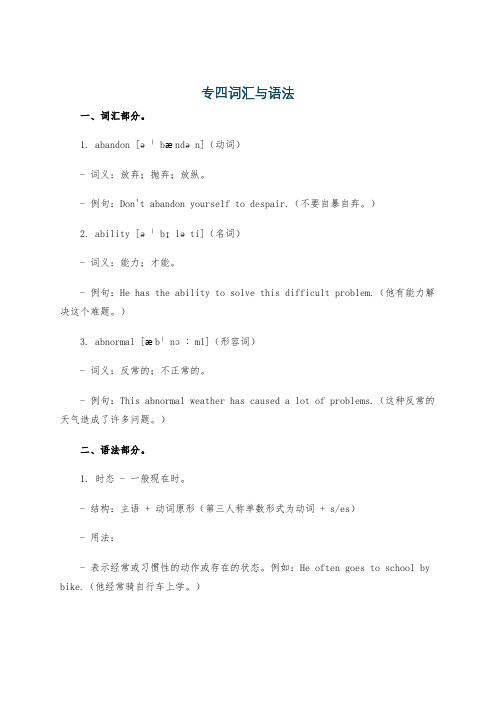
专四词汇与语法一、词汇部分。
1. abandon [əˈbændən](动词)- 词义:放弃;抛弃;放纵。
- 例句:Don't abandon yourself to despair.(不要自暴自弃。
)2. ability [əˈbɪləti](名词)- 词义:能力;才能。
- 例句:He has the ability to solve this difficult problem.(他有能力解决这个难题。
)3. abnormal [æbˈnɔːml](形容词)- 词义:反常的;不正常的。
- 例句:This abnormal weather has caused a lot of problems.(这种反常的天气造成了许多问题。
)二、语法部分。
1. 时态 - 一般现在时。
- 结构:主语 + 动词原形(第三人称单数形式为动词 + s/es)- 用法:- 表示经常或习惯性的动作或存在的状态。
例如:He often goes to school by bike.(他经常骑自行车上学。
)- 表示客观事实或普遍真理。
例如:The earth moves around the sun.(地球绕着太阳转。
)2. 名词的数 - 可数名词复数形式。
- 规则变化:- 一般情况加 -s,如book - books。
- 以s, x, ch, sh结尾的加 -es,如box - boxes。
- 以辅音字母 + y结尾的,变y为i加 -es,如city - cities。
- 不规则变化:- 如man - men,woman - women,child - children等。
3. 形容词和副词的比较级和最高级。
- 规则变化:- 单音节词和部分双音节词:- 一般情况加 -er(比较级)和 -est(最高级),如tall - taller - tallest。
- 以e结尾的加 -r和 -st,如nice - nicer - nicest。
英语词汇辨析与语法知识点梳理
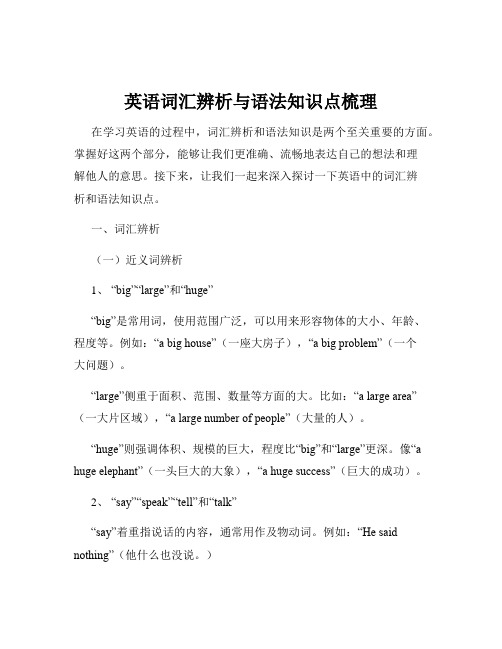
英语词汇辨析与语法知识点梳理在学习英语的过程中,词汇辨析和语法知识是两个至关重要的方面。
掌握好这两个部分,能够让我们更准确、流畅地表达自己的想法和理解他人的意思。
接下来,让我们一起来深入探讨一下英语中的词汇辨析和语法知识点。
一、词汇辨析(一)近义词辨析1、“big”“large”和“huge”“big”是常用词,使用范围广泛,可以用来形容物体的大小、年龄、程度等。
例如:“a big house”(一座大房子),“a big problem”(一个大问题)。
“large”侧重于面积、范围、数量等方面的大。
比如:“a large area”(一大片区域),“a large number of people”(大量的人)。
“huge”则强调体积、规模的巨大,程度比“big”和“large”更深。
像“a huge elephant”(一头巨大的大象),“a huge success”(巨大的成功)。
2、“say”“speak”“tell”和“talk”“say”着重指说话的内容,通常用作及物动词。
例如:“He said nothing”(他什么也没说。
)“speak”常指说某种语言或在公开场合发言。
比如:“She speaks English very well”(她英语说得很好。
)“He will speak at the meeting”(他将在会议上发言。
)“tell”意为“告诉”,常接双宾语。
像“Tell me the truth”(告诉我真相。
)“talk”强调双方交流、交谈,是不及物动词。
例如:“They are talking happily”(他们正愉快地交谈着。
)(二)形近词辨析1、“quite”和“quiet”“quite”意思是“相当;完全”,是一个副词。
例如:“It's quite cold today”(今天相当冷。
)“quiet”意思是“安静的;平静的”,是形容词。
比如:“Keep quiet in the library”(在图书馆保持安静。
英语考试知识点整理

英语考试知识点整理英语考试知识点整理为题英语考试是我们平时学习中的一项重要任务,对于能否取得较好的成绩,我们需要了解并熟练掌握一些常见的英语考试知识点。
本文将为大家整理并介绍一些常见的英语考试知识点,希望对大家备考英语考试有所帮助。
1. 词汇知识词汇是语言学习中非常重要的一部分,对于英语考试来说更是关键。
备考英语考试时,要重点掌握各类词汇的拼写、词义、词性和用法。
需要掌握的词汇知识包括常见的高频词汇、同义词、反义词、近义词以及常用短语和习语等。
2. 语法知识语法是英语考试中的一个重要环节。
掌握基本的语法知识可以帮助我们正确理解和使用英语。
在备考英语考试的过程中,我们需要了解英语的基本句型、时态、语态、多种从句、复合句和并列句等语法知识,同时要能够正确地运用这些知识进行句子的构建和转换。
3. 阅读理解阅读理解是英语考试中常见的一种题型,也是考察学生阅读能力的重要途径。
备考英语考试时,我们需要多进行阅读练习,提高读文章的速度和理解文章的能力。
同时,还需要熟悉各类题型的解题技巧,如主旨题、细节题、推理题、词义题等。
4. 听力理解听力理解是英语考试中的另一种常见题型。
备考英语考试时,我们需要进行大量的听力训练,提高听力的准确度和速度。
同时,我们还需要熟悉各类听力题型的解题技巧,如听力填空、选择题、配对题等。
5. 写作技巧写作是英语考试中的一项重要内容。
备考英语考试时,我们需要熟悉各类写作题型的要求和标准,掌握一些常用的写作技巧。
写作技巧包括如何进行写作思路的构建、如何进行句子的表达和段落的组织、如何使用恰当的连接词和过渡词等。
6. 口语表达口语是英语考试中的一部分,也是考察学生口语表达能力的一种方式。
备考英语考试时,我们需要多进行口语练习,提高自己的口语表达能力和交流能力。
可以与朋友或老师进行口语对话,也可以通过录音来进行自我评估和提高。
7. 翻译技巧翻译是英语考试中的一项重要内容。
备考英语考试时,我们需要掌握一些常见的翻译技巧,如基本的词义转换、句子结构的调整和上下文的理解等。
初中英语知识点的基础语法与词汇总结
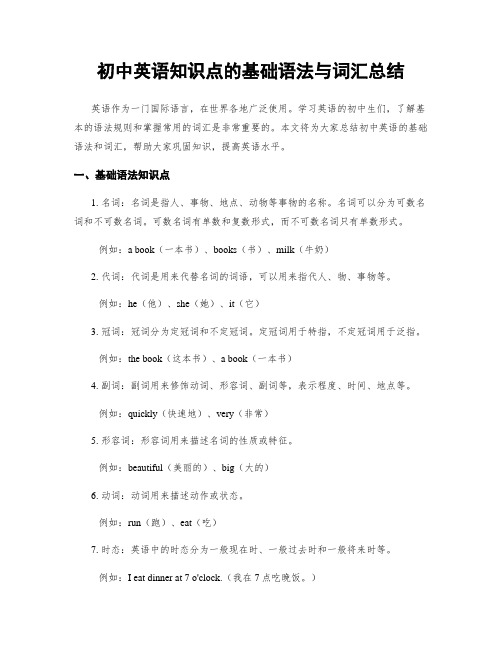
初中英语知识点的基础语法与词汇总结英语作为一门国际语言,在世界各地广泛使用。
学习英语的初中生们,了解基本的语法规则和掌握常用的词汇是非常重要的。
本文将为大家总结初中英语的基础语法和词汇,帮助大家巩固知识,提高英语水平。
一、基础语法知识点1. 名词:名词是指人、事物、地点、动物等事物的名称。
名词可以分为可数名词和不可数名词。
可数名词有单数和复数形式,而不可数名词只有单数形式。
例如:a book(一本书)、books(书)、milk(牛奶)2. 代词:代词是用来代替名词的词语,可以用来指代人、物、事物等。
例如:he(他)、she(她)、it(它)3. 冠词:冠词分为定冠词和不定冠词。
定冠词用于特指,不定冠词用于泛指。
例如:the book(这本书)、a book(一本书)4. 副词:副词用来修饰动词、形容词、副词等,表示程度、时间、地点等。
例如:quickly(快速地)、very(非常)5. 形容词:形容词用来描述名词的性质或特征。
例如:beautiful(美丽的)、big(大的)6. 动词:动词用来描述动作或状态。
例如:run(跑)、eat(吃)7. 时态:英语中的时态分为一般现在时、一般过去时和一般将来时等。
例如:I eat dinner at 7 o'clock.(我在7点吃晚饭。
)8. 句型:英语中常用的句型有陈述句、疑问句、祈使句和感叹句等。
例如:What time is it?(现在几点了?)二、基础词汇总结1. 数字:掌握数字对于学习英语非常重要,可以用于表示时间、年龄等。
例如:one(一)、ten(十)、twenty(二十)2. 学科词汇:学习不同学科需要掌握相应的词汇。
例如:math(数学)、science(科学)3. 家庭词汇:掌握家庭成员的称呼和描述。
例如:father(父亲)、sister(姐妹)4. 动物词汇:了解不同动物的英文名称。
例如:dog(狗)、cat(猫)5. 城市和国家:学习国际地理需要了解各个城市和国家的名称。
英语入门学习英语基本语法和词汇
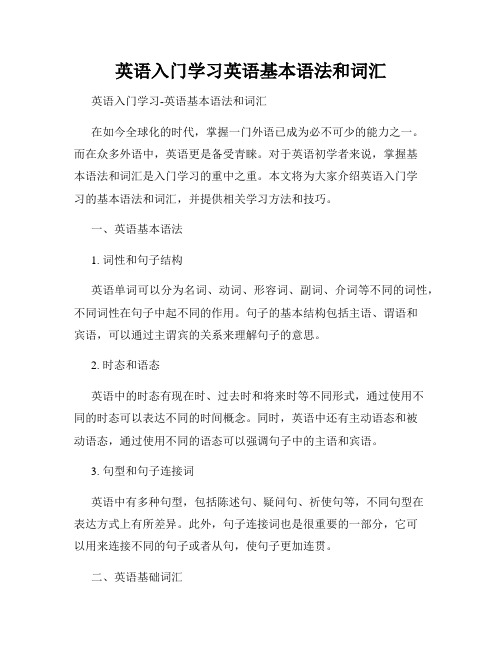
英语入门学习英语基本语法和词汇英语入门学习-英语基本语法和词汇在如今全球化的时代,掌握一门外语已成为必不可少的能力之一。
而在众多外语中,英语更是备受青睐。
对于英语初学者来说,掌握基本语法和词汇是入门学习的重中之重。
本文将为大家介绍英语入门学习的基本语法和词汇,并提供相关学习方法和技巧。
一、英语基本语法1. 词性和句子结构英语单词可以分为名词、动词、形容词、副词、介词等不同的词性,不同词性在句子中起不同的作用。
句子的基本结构包括主语、谓语和宾语,可以通过主谓宾的关系来理解句子的意思。
2. 时态和语态英语中的时态有现在时、过去时和将来时等不同形式,通过使用不同的时态可以表达不同的时间概念。
同时,英语中还有主动语态和被动语态,通过使用不同的语态可以强调句子中的主语和宾语。
3. 句型和句子连接词英语中有多种句型,包括陈述句、疑问句、祈使句等,不同句型在表达方式上有所差异。
此外,句子连接词也是很重要的一部分,它可以用来连接不同的句子或者从句,使句子更加连贯。
二、英语基础词汇1. 基本词汇学习英语的基础阶段,需要掌握一些基本词汇,包括数字、颜色、家庭成员、动物、水果等常见的词汇。
这些词汇在日常交流中经常会被用到,是学习英语的重要基础。
2. 动词和形容词动词是句子的核心词汇,可以用来表示行为或状态。
形容词则用来描述名词的特征或性质。
学习常用的动词和形容词,可以帮助我们更准确地表达自己的意思。
3. 时态和语态相关词汇针对不同的时态和语态,有一些特定的词汇需要掌握,比如表示过去时间的词汇如yesterday、last week等,表示将来时间的词汇如tomorrow、next year等,表示被动语态的词汇如is、are等。
三、学习方法和技巧1. 多听多读多说多写英语学习注重提高听、说、读、写四项能力。
通过多听听力材料,多读文章,多与他人交流,多写作文等方式,可以提高自己的语感和语言表达能力。
2. 制定学习计划和目标制定合理的学习计划和目标,可以帮助我们更有针对性地进行学习。
语言学中的语法与词汇
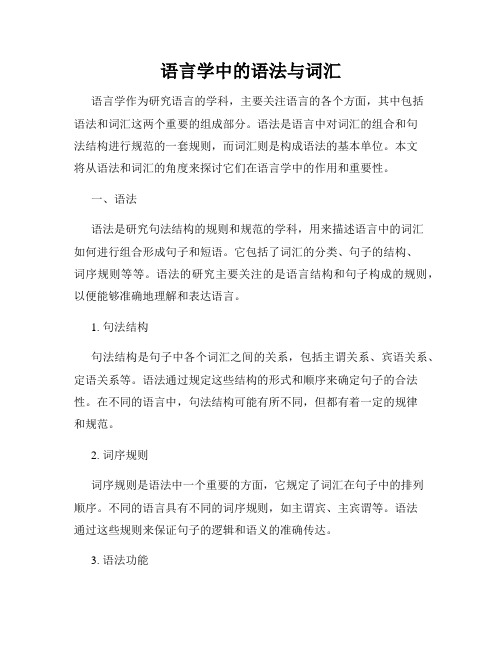
语言学中的语法与词汇语言学作为研究语言的学科,主要关注语言的各个方面,其中包括语法和词汇这两个重要的组成部分。
语法是语言中对词汇的组合和句法结构进行规范的一套规则,而词汇则是构成语法的基本单位。
本文将从语法和词汇的角度来探讨它们在语言学中的作用和重要性。
一、语法语法是研究句法结构的规则和规范的学科,用来描述语言中的词汇如何进行组合形成句子和短语。
它包括了词汇的分类、句子的结构、词序规则等等。
语法的研究主要关注的是语言结构和句子构成的规则,以便能够准确地理解和表达语言。
1. 句法结构句法结构是句子中各个词汇之间的关系,包括主谓关系、宾语关系、定语关系等。
语法通过规定这些结构的形式和顺序来确定句子的合法性。
在不同的语言中,句法结构可能有所不同,但都有着一定的规律和规范。
2. 词序规则词序规则是语法中一个重要的方面,它规定了词汇在句子中的排列顺序。
不同的语言具有不同的词序规则,如主谓宾、主宾谓等。
语法通过这些规则来保证句子的逻辑和语义的准确传达。
3. 语法功能语法的主要功能是使人们能够理解和表达语言。
它规定了语言的结构和句子的组成规则,使得人们能够根据这些规则来理解和解读语言。
同时,语法也为人们提供了一种准确和系统化的方式来表达自己的思想和观点。
二、词汇词汇是构成语言的基本单位,它由各种不同的词汇类别组成,如名词、动词、形容词等。
词汇是语法的基础,也是语言表达的重要组成部分。
1. 词汇类别不同的语言包含着不同的词汇类别,这些类别常常以词性来划分,如中文中的名词、动词和形容词等。
词汇类别不仅反映了语言中的事物、动作和属性等概念,也为语法提供了基本的构建材料。
2. 词汇的功能词汇除了代表具体的事物和概念外,还具有一定的语法功能。
词汇的选用和使用能够改变句子的句法结构和意义,使得表达更加精确和准确。
同时,不同的词汇之间也存在着一定的关联性和搭配规则,这些规则对于语言的正常理解和使用非常重要。
3. 词汇的学习和应用词汇的学习和应用是学习一门新语言的基础。
英语词汇辨析与语法知识点梳理
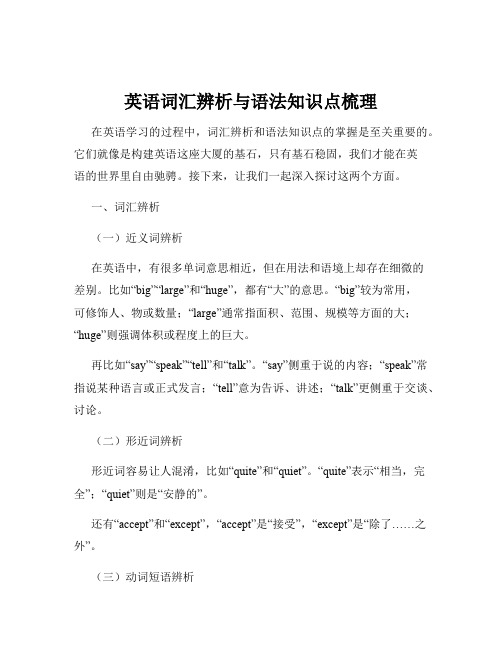
英语词汇辨析与语法知识点梳理在英语学习的过程中,词汇辨析和语法知识点的掌握是至关重要的。
它们就像是构建英语这座大厦的基石,只有基石稳固,我们才能在英语的世界里自由驰骋。
接下来,让我们一起深入探讨这两个方面。
一、词汇辨析(一)近义词辨析在英语中,有很多单词意思相近,但在用法和语境上却存在细微的差别。
比如“big”“large”和“huge”,都有“大”的意思。
“big”较为常用,可修饰人、物或数量;“large”通常指面积、范围、规模等方面的大;“huge”则强调体积或程度上的巨大。
再比如“say”“speak”“tell”和“talk”。
“say”侧重于说的内容;“speak”常指说某种语言或正式发言;“tell”意为告诉、讲述;“talk”更侧重于交谈、讨论。
(二)形近词辨析形近词容易让人混淆,比如“quite”和“quiet”。
“quite”表示“相当,完全”;“quiet”则是“安静的”。
还有“accept”和“except”,“accept”是“接受”,“except”是“除了……之外”。
(三)动词短语辨析动词短语的辨析也是重点之一。
例如“put on”“wear”和“dress”。
“put on”强调穿的动作;“wear”表示穿着的状态;“dress”常表示给某人穿衣。
“look for”“find”和“find out”也有所不同。
“look for”是寻找的过程;“find”是找到的结果;“find out”则是经过一番努力查明、弄清楚。
二、语法知识点梳理(一)名词1、名词的数名词分为可数名词和不可数名词。
可数名词有单数和复数形式,不可数名词没有复数形式。
例如,“apple”是可数名词,“water”是不可数名词。
2、名词所有格表示所属关系,有“’s”所有格和“of”所有格。
“Tom’s book”(汤姆的书)是“’s”所有格,“the window of the room”(房间的窗户)是“of”所有格。
专升本英语语法与词汇知识点总结

专升本英语语法与词汇知识点总结英语在专升本考试中占据着重要的地位,而语法和词汇则是英语学习的基石。
掌握好语法和词汇,对于提升英语成绩,顺利通过专升本考试至关重要。
以下是为大家总结的专升本英语语法与词汇的重要知识点。
一、语法知识点1、时态时态是英语语法中的重点,包括一般现在时、一般过去时、一般将来时、现在进行时、过去进行时、现在完成时、过去完成时、过去将来时等。
一般现在时表示经常发生的动作或存在的状态,如:I go to school every day(我每天上学。
)一般过去时表示过去发生的动作或存在的状态,如:He played football yesterday(他昨天踢足球了。
)一般将来时表示将来要发生的动作或存在的状态,如:I will go to Beijing next week(我下周要去北京。
)现在进行时表示正在进行的动作,如:They are watching TV now (他们现在正在看电视。
)过去进行时表示过去某个时刻正在进行的动作,如:I was reading a book at eight last night(昨晚八点我正在读书。
)现在完成时表示过去发生的动作对现在造成的影响或结果,如:I have finished my homework(我已经完成了作业。
)过去完成时表示过去某个时间之前已经完成的动作,如:By the end of last year, I had learned 3000 words(到去年年底,我已经学了 3000 个单词。
)2、语态语态分为主动语态和被动语态。
主动语态表示主语是动作的执行者,被动语态表示主语是动作的承受者。
被动语态的构成是“be +过去分词”,如:The book is written by him (这本书是他写的。
)3、非谓语动词非谓语动词包括动词不定式、动名词和分词(现在分词和过去分词)。
动词不定式可以作主语、宾语、定语、状语等,如:To learn English well is not easy(学好英语不容易。
高一英语重点知识归纳
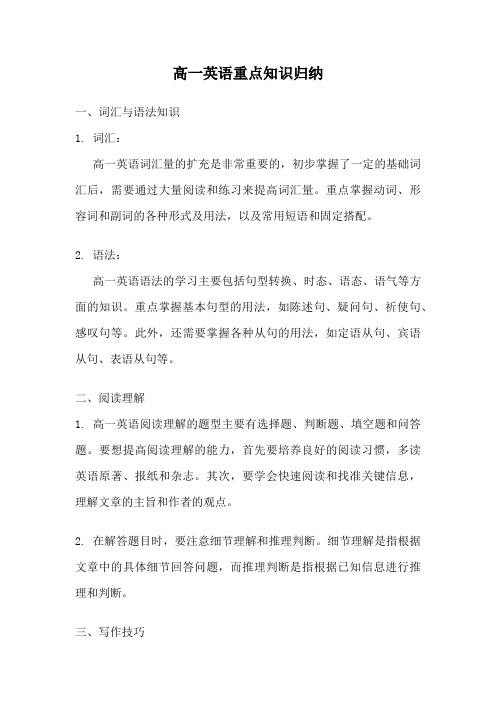
高一英语重点知识归纳一、词汇与语法知识1. 词汇:高一英语词汇量的扩充是非常重要的,初步掌握了一定的基础词汇后,需要通过大量阅读和练习来提高词汇量。
重点掌握动词、形容词和副词的各种形式及用法,以及常用短语和固定搭配。
2. 语法:高一英语语法的学习主要包括句型转换、时态、语态、语气等方面的知识。
重点掌握基本句型的用法,如陈述句、疑问句、祈使句、感叹句等。
此外,还需要掌握各种从句的用法,如定语从句、宾语从句、表语从句等。
二、阅读理解1. 高一英语阅读理解的题型主要有选择题、判断题、填空题和问答题。
要想提高阅读理解的能力,首先要培养良好的阅读习惯,多读英语原著、报纸和杂志。
其次,要学会快速阅读和找准关键信息,理解文章的主旨和作者的观点。
2. 在解答题目时,要注意细节理解和推理判断。
细节理解是指根据文章中的具体细节回答问题,而推理判断是指根据已知信息进行推理和判断。
三、写作技巧1. 写作的重点是要能够准确地表达自己的观点和想法。
要注意语法的正确性,尽量使用多样化的句式和词汇,避免重复和冗长。
2. 写作时要注意段落结构的合理安排,每个段落都应有一个明确的主题句,并围绕主题句展开论述。
同时,要注意使用恰当的过渡词和连接词,使文章的逻辑关系流畅清晰。
四、听力训练1. 高一英语听力训练主要包括听对话和听短文两种形式。
要提高听力能力,首先要培养良好的听觉习惯,多听英语材料,尤其是正常语速的英语材料。
2. 在听对话和听短文时,要注意抓住关键信息,如人物、地点、时间、事件等。
同时,要注意辨别说话者的语气和语调,以便更好地理解对话和短文的内容。
五、口语表达1. 高一英语口语表达主要包括日常交际用语和口头表达能力的培养。
要提高口语表达能力,首先要多加练习,多与他人进行英语对话。
可以通过模仿、角色扮演和实际应用等方式来提高口语能力。
2. 口语表达时要注意语音语调的准确性,尽量模仿标准的英语发音和语调。
同时,要注意语法的正确性和词汇的丰富性,以便能够更准确地表达自己的意思。
英语词汇与语法知识名词详解

英语词汇与语法基础知识英语名词(Noun)可以从形式上进行分类, 英语名词可以划分成专有名词和普通名词两大类。
从意义上划分, 英语名词可分为个体名词、集体名词、物质名词和抽象名词四类。
一般来说, 个体名词可以用数目来计算, 称为可数名词(Countable Nouns)。
物质名词、抽象名词和专有名词无法用数目来计算, 称为不可数名词(Uncountable Nouns)。
集合名词有的可数, 有的不可数。
一、普通名词普通名词指一类人或事物的名称。
英语中普通名词分为可数名词和不可(2)可数名词复数形式的不规则构成法英语中有一部分名词由于历史或词源原因其复数形式的构成法是不规则的。
这种情况主要有:①元音字母变化。
例如:foot-feet man-men . woman-womentooth-teeth goose-geese mouse-mice②结尾为-en。
例如: child-children③单复数同形。
单复数同形的名词主要有: sheep, fish, Chinese, Japanese, deer等。
④只有复数形式。
例如: trousers, goods 等。
(二)可数名词和不可数名词英语中的绝大多数名词既可以用作可数名词也可以用作不可数名词。
1. 可数名词可数名词一般可以分成以下三类:第一类: 如bike, desk, factory等, 这类名词占可数名词的多数。
以bike为例:There are fifty bikes at this shop. 这家商店有50辆自行车。
第二类: 如clothes等, 本身表示复数形式。
以clothes为例:She cares for nice clothes. 她爱好穿着。
2. 不可数名词不可数名词的用法特征主要有以下几种:(1)不带冠词的单数形式需用动词单数作谓语。
例如:Knowledge is power. 知识就是力量。
(2)由much, little等词修饰。
英语基础语法和词汇

英语基础语法和词汇一、基础语法。
1. 名词(noun,[naʊn])- 定义:表示人、事物、地点、抽象概念等的名称。
- 分类:- 可数名词(countable noun):有单复数形式,如book([bʊk]) - books。
- 不可数名词(uncountable noun):没有复数形式,如water(['wɔːt ə]),milk([mɪlk])。
- 名词所有格:- 表示所属关系,有's形式,如Tom's book(汤姆的书)。
2. 动词(verb,[vɜːb])- 定义:表示动作或状态。
- 分类:- 及物动词(transitive verb,[ˈtrænzətɪv vɜːb]):后面必须跟宾语,如I love apples(我爱苹果),“love”是及物动词,“apples”是宾语。
- 不及物动词(intransitive verb,[ɪnˈtrænzətɪv vɜːb]):后面不跟宾语,如He runs fast(他跑得快),“runs”是不及物动词。
- 动词的时态:- 一般现在时:表示经常或习惯性的动作或状态。
主语为第三人称单数时,动词要加 -s或 -es,如He likes reading(他喜欢阅读)。
- 一般过去时:表示过去某个时间发生的动作或存在的状态,动词一般加 -ed (规则动词),如I played football yesterday(我昨天踢足球了)。
- 一般将来时:表示将来要发生的动作或存在的状态,结构为will+动词原形或be going to+动词原形,如He will go to school tomorrow(他明天将去上学)。
3. 形容词(adjective,[ˈædʒɪktɪv])- 定义:用来修饰名词,表示人或事物的特征。
- 位置:一般放在名词前面,如a beautiful flower(一朵美丽的花),“beautiful”([ˈbjuːtɪfl])是形容词,修饰“flower”。
高中英语学习需要掌握哪些词汇和语法?

高中英语学习需要掌握哪些词汇和语法?高中阶段是英语学习的关键时期,是学生打好英语基础、为未来学习和发展奠定良好基础的阶段。
所以,能够掌握必要的词汇和语法知识十分有利。
本文将从教育专家的角度,分析高中英语学习所需完全掌握的词汇和语法知识,并提供一些学习建议。
一、词汇方面高中英语学习需要完全掌握约两千个核心词汇,以及部分常用词组和习惯用语。
这些词汇涵盖以下几个方面:1. 常用词汇: 涵盖日常生活、学习、工作等各个方面的基本词汇。
比如:family, friend, school, work, surprise, sad, big, small等。
2. 主题词汇: 包含不同学科和主题的专业词汇。
比如:biology, history, literature, technology, economy等。
3. 语法词汇: 包括连接词、介词、代词等能够连接句子和词语的词汇。
比如:and, sometimes, because, for, returning, did, he, she, it等。
4. 高级词汇: 包含一些抽象的概念、文学、学术方面的词汇,能够使语言表达更加精准、生动。
比如:sophisticated, intricate, profound, evocative, paradigm等。
二、语法方面高中英语学习需要掌握的基本语法知识包括:1. 词性: 名词、代词、形容词、副词、动词、介词、连词等。
2. 时态: 一般现在时、一般过去时、一般将来时、现在进行时、过去进行时、将来进行时、现在完成时、过去完成时、将来完成时。
3. 语态: 英语有两种语态:主动语态和被动语态。
4. 句型: 简单句、并列句、复合句,以及各种特殊从句(定语从句、状语从句、宾语从句等)。
5. 其他重要语法点: 包括虚拟语气、倒装句、强调句、非谓语动词等。
三、学习建议1. 循序渐进,夯实基础: 从基础词汇和语法入手,逐渐扩充词汇量,深入理解语法规则。
- 1、下载文档前请自行甄别文档内容的完整性,平台不提供额外的编辑、内容补充、找答案等附加服务。
- 2、"仅部分预览"的文档,不可在线预览部分如存在完整性等问题,可反馈申请退款(可完整预览的文档不适用该条件!)。
- 3、如文档侵犯您的权益,请联系客服反馈,我们会尽快为您处理(人工客服工作时间:9:00-18:30)。
词汇和语法知识(三)1. I shall never forget _____her ____the song.A. to hear; to singB. to hear; singC. hearing; singD. hearing; sing2. The assistant worked into night, ______a long speech for the manager.A. to prepareB. preparingC. preparedD. was preparing3. ____ it right, I tried again.A. Not having doneB. Not doingC. Not being doneD. Having not done4. ----You look very handsome today.----Maybe I just had _____.A. cut my hairB. my hair cutC. my hairs cutD. cutting his hair5. ___in thought, she almost knocked into the man in front of her.A. LosingB. Having lostC. LostD. To lost6. Don’t be nervous, it’s quite safe to walk on the ____river.A. freezingB. frozenC. freezeD. having frozen7. Not only ____polluted but _____crowded.A. was the city; were the streetsB. the city was; the streets wereC. was the city; the streets wereD. the city was; were the streets8. His uncle is _____. He is a ____ man.A. six feet tall; forty-years-oldB. six foot tall; forty-year-oldC. six feet tall; forty-year-oldD. six feet tall; forties-year-old9. It’s careless ____so many mistakes.A. of you to makeB. for you to makeC. of you makingD. for you making10. I’m sorry for _____you so much trouble.A. being broughtB. broughtC. having broughtD. to brought11. The whole box of matches ____wet. We can’t light any one.A. isB. areC. wasD. were12. Every picture except these two ____.A. is soldB. have soldC. has been soldD. were sold13. Never ____forget the days when ____together with you.A. shall I ; did I liveB. I shall; did I liveC. I shall; I livedD. shall I; I lived14. ____this material can be used in our factory has not been studied yet.A. WhatB. ThatC. WhetherD. If15. He suggested _____a discussion of the subject.A. to haveB. should haveC. haveD. having16. No sooner had I sat down _____the telephone rang.A. whenB. atC. asD. than17. Unless _____to speak, you should remain silent at the conference.A. invitedB. invitingC. being invitedD. having invited18. ----Why was he fined ?----He happened to ___several flowers in the park.A. be seen pickB. be seen pickingC. be caught to pickD. catch picking19. ----Who do you think _____ him so angry?----I have no idea because I was not at home then.A. had madeB. to makeC. to have madeD. made20._____comes first will be served first.A. No matter whoB. AnyoneC. Those whoD. Whoever21. Although she felt angry, she ____to speak politely.A. controlledB. succeededC. managedD. forced22. This morning mother ____her little daughter in her new clothes.A. woreB. dressedC. put onD. hand on23. The only thing _____really matters to the children is how soon they can return to their uncle’s farm.A. thatB. whichC. whatD. all24. The question _____tomorrow is what we should do to help these poor children.A. to be discussedB. to discussC. discussedD. being discussed25. ____, they went to the playground.A. Their homework finishedB. Their homework was finishedC. Their homework being finishedD. Their homework had been finished26. Only _____as an interpreter_____ how important it was to practice speaking English.A. when did I work; I realizedB. when did I work; did I realizeC. when I work; did I realizeD. when I worked; did I realize27. _____he looked after the old man year after year moved us deeply.A. WhatB. ThatC. WhenD. Why28. In spite of 30 years old it seems as if she _____a child.A. wereB. isC. should beD. would be29. _____ in my work is the most important to me.A. HappyB. HappilyC. happinessD. happyness30. It was 1776 _____ the United States was founded.A. thatB. on whichC. whichD. when31. ______on the TV, the new president will take office next month.A. It is reportingB. As is reportedC. Which is reportedD. It is reported32. About 70 ____of the earth’s surface ____covered with water.A. percent; areB. percent; areC. percents; isD. percent; is33. The price of this training is _____than that one.A. more expensiveB. a bit higherC. a little expensiveD. many higher34. He considered it no good _____ again.A. to doB. doingC. doneD. done35. ----____progress you have made this term, George!----Thank you, but I have a long way to go.A. What a goodB. How rapidC. What greatD. How big36. He kept a little notebook, in which ____the names and addresses of his friends.A. wroteB. writingC. was writtenD. were written37. Was it not until midnight ____ the experiment?A. did he finishB. that he finishedC. when they finishedD. that did he finish38. You don’t need to describe her I ____her several times.A. had metB. had meetingC. metD. have met39. He will have to work as hard as he can ____for the final examination.A. prepareB. to prepareC. preparingD. prepared40. ____for a long time, but he tried to catch up with his classroomates at last.A. Having been illB. Being illC. He was illD. Though ill41. ____the letter, he went out to post it.A. WritingB. To writeC. Having writtenD. Written42. It was thanks to him _____I made great progress in my English learning.A. whoB. whomC. whoseD. that43. Football, ____is a very much loved game, is played all over the world.A. thatB. whatC. whichD. for which44. John is good at his job but he seems to _____confidence.A. lackB. be short forC. be shortD. lack of45. Ten years ago, there was an old man ____in that house.A. livedB. livingC. liveD. was living46. “Be careful while ____the street, Tom.” said the policeman.A. to crossB. crossingC. crossD. across47. I’m looking forward _____your pen-friend.A. beingB. to beC. beD. to being48. I have five color pencils. One is red, another is blue and ____are green.A. otherB. the otherC. othersD. the others49. We are studying in a reading-room, ______faces south.A. the doorB. which doorC. the door of whichD. the door of it50. She is pleased with ____you have said and ____you have done.A. what; thatB. which; whichC. what; all thatD. what; all what51. The book is not so interesting as _____I bought yesterday.A. the oneB. itC. suchD. which52. The ____of the house were covered with _____.A. roofs; leavesB. roofs; leafsC. rooves; leavesD. rooves; leafs53. _____white, the kitchen looks much better than before.A. PaintsB. PaintedC. PaintingD. To paint54. You have _____all her life and all her hope.A. hurtB. damagedC. harmedD. destroyed55. ----Why haven’t you bought any milk?----I ____to but I forget about it.A. likedB. wishedC. expectedD. meant56. It was raining so hard that_____ of her feet were quite wet.A. allB. eachC. eitherD. both57. ____as he is, she can play ____table tennis and ____violin pretty well.A. A child; the; theB. A child; /; theC. child; /; theD. child; the; /58. How can ____little children do _____much work in a day?A. so; muchB. so; soC. such; suchD. such; so59. We had to stand there in the rain, _____for the next bus ____.A. waiting; to arriveB. waited; to arriveC. waiting; arrivingD. waited; arriving60. I wonder if you know anybody ____parents work at the airport.A. whoseB. theirC. hisD. her词汇和语法知识(四)1. They decided to _____could help them out of difficulty.A. turn to whomeverB. turn to whoeverC. ask for whoeverD. ask for whom2. _____the poem a second time, the meaning will become clearer to you.A. You having readB. While readingC. I f readingD. When you read3. _____he spoke I recognized him.A. The momentB. WhereC. At the momentD. In a moment4. Let the boy_____, he is too tired.A. sittingB. be seatedC. seatedD. sat5. ----What was your daughter doing when I _____you yesterday afternoon?----She ____back from school and was doing her homework.A. telephoned; had just comeB. was telephoning; just cameC. had telephoned; just cameD. would telephone; was just coming6. Mr. Read made up his mind to devote all he had to ____some schools for poor children.A. set upB. setting upC. have set upD. having set up7. It was for this reason _____her uncle moved out of New York and settled down in a small village.A. whichB. whyC. thatD. how8. ----Nancy isn’t coming tonight.----But she _____!A. promisesB. promisedC. will promiseD. had promised9. The cake is delicious. He’d like to have ____third one because ____second one is rather too small.A. a; aB. the; theC. a; theD. the; a10. He entered the room, _____, turned on his computer and began to deal with his business.A. sat downB. and sat downC. sitting downD. having sat down11. ----Will you go to the ball?----No. Even if _____, I won’t.A. invitedB. invitingC. not invitedD. not inviting12. ----Why was he fined?----He happened to ____several flowers in the park.A. be seen pickB. be seen pickingC. be caught to pickD. catch picking13. With all the work ____, I don’t know if I have time to go out.A. doneB. to doC. to be doneD. doing14. We should prevented pollution ____ happily.A. from livingB. for livingC. to liveD. living15.____is known to everybody, the moon travels round the earth once every month.A. ItB. AsC. ThatD. What16. _____, he does get angry with her sometimes.A. Although much he likes herB. Much although he likes herC. As he likes her muchD. Much as he likes her17. Was _____that I saw last night at the concert?A. it youB. not youC. youD. that yourself18. When you read a book, you’d better make a mark _____you have any questions.A. in the placeB. at whichC. whereD. in which19. It is suggested that a doctor ____immediately.A. be sent forB. send forC. is sent forD. should send for20. I thought her nice and honest ______ I met her.A. first timeB. for the first timeC. the first timeD. by the first time21. With the wall _____, you can see the inside of the room.A. removesB. removedC. removingD. to remove22. ----Shall we get up, Betty?---- It’s only five o’clock now. ____is no need for us to get up so early. Don’t you think so ?A. ItB. ThisC. ThatD. There23. ----What did the doctor say yesterday afternoon?----He said, “ _____on time, this medicine will be quite effective.A. TakingB. Being takenC. TakenD. Having taken24. You ____be tired -----you’ve only been working for an hour.A. must notB. won’tC. can’tD. may not25. The old worker insisted that he _____back to the working post again.A. was sentB. be sentC. sendD. sent26. ----It took me ten years to build up my business, and it almost killed me.----Well, you know what they say. ______.A. There is no smoke without fineB. Practice makes perfectC. All roads lead to RomeD. No pains, no gains27. We haven’t settled the question of _____it is necessary for him to study abroad.A. ifB. whereC. whetherD. that28. A poet and artist ______coming to speak to us about Chinese literature and painting tomorrow afternoon.A. isB. areC. wasD. were29. John is studying in a _____school.A. famous German medicalB. German famous medicalC. German medical famousD. famous medical German30. This lake is _____that one.A. five times larger thanB. larger five times thanC. five times as larger asD. five times large as31. Mr. John’s wages as a lawyer is much higher than _____.A. a teacherB. as a teacherC. that of a teacherD. that of a teacher’s32. Last Sunday I came ______a friend of mine on my way to the shop.A. outB. uponC. throughD. of33. The hunter _____his gun against the price tree and _____down for a rest.A. laid; layB. lay; laidC. laid; liedD. lied; lay34. ----Mum, I’ve got the first place in the competition.----______.A. That’s all right.B. Really? You are lucky.C. Wonderful!D. Congratulations on your success.35. Greatly moved by her words, _____.A. tears came to his eyesB. his eyes were filled with teaC. he could hardly hold back his tearsD. tears could hardly he held back36. It was what he meant rather than what he said_____ made me angry.A. whatB. whoC. thatD. which37. ----Did a letter come for me?----Yes, _____came for you this morning.A. thisB. oneC. itD. it38. I’m examining the article he has just finished_____ the possible mistakes in it.A. correctingB. to correctC. correctedD. having corrected39. A school with five hundred desks and chairs ____to the poor village as a gift of the local government.A. is offeredB. has offeredC. are offeredD. have been offered40. ----I went to see you at about ten this morning but you were not in the office.----Oh, that was probably _____I was talking with the headmaster.A. whyB. whereC. whenD. how41. _____Shanghai you see today is quite ____different city from what it used to be.A. The; aB. A; aC. The; /D. /; the42. _____a teacher, I should set a good example to the students.A. BeB. To beC. BeingD. Having been43. ----What’s the trouble?----The family never agree about _____ shares of the possessions.A. herB. itsC. theirD. his44. They are said _____an office building now on the other side of the river, which will be completed next year.A. buildingB. to be buildingC. to be builtD. to build45. ----Who’s knocking at the door?----_____must be Miss Li. She said she would _____me tonight.A. It; drop onB. She; drop atC. It; drop in onD. She; drop in on46. It was five o’clock in the afternoon _____they climbed up to the top of the mountain.A. sinceB. whenC. thatD. until47. ----I don’t suppose he could have done well in the exam last week, _____he?----______, he almost failed to pass the exam.A. did; NoB. had; YesC. couldn’t; YesD. has; No48. You’d better take some medicine with you _____someone gets sick.A. so thatB. as long asC. in caseD. as long as49. ----How much vinegar did you put in the salad?----I’m sorry to say, ____. I forget.A. nothingB. noneC. no oneD. some50. There are some tiny errors in your book on the subject but, _____, you have donea very good job, I think.A. first of allB. on the wholeC. in one wordD. generally speaking词汇和语法知识(五)1. Tom was about to have supper ____the door bell rang.A. asB. soonC. whenD. while2. My family _____moved to Guangzhou.A. hasB. haveC. isD. are3. All of us but Peter _____the correct answer to the question.A. knowsB. knowC. doesn’t knowD. hasn’t known4. _____more and more forests destroyed, some animals are facing the danger of dying out.A. AsB. ByC. ForD. With5. Only when _____her mistake _____that she was completely wrong.A. he pointed out; did she realizeB. did he point out; did she realizeC. he pointed out; she realizedD. did he point out; she realized6. A week is too very long. Try to be back in a _____of days.A. numberB. dozenC. coupleD. score7. The reason _____she gave for not coming to the party is that her mother won’t allow her to.A. whatB. whyC. asD. which8. ----I can’t work the math problem out. What shall I do?---- ____, Peter. I’ll help you out.A. Take it awayB. Don’t lose your heartC. Take it easyD. Don’t be afraid9. The sun was shining brightly, ____everything there _____more beautiful.A. to make; lookedB. making; lookC. and made; lookingD. and making; be looked10. ----Could I borrow your dictionary?----Yes, of course, you ____, but you must take good care of it.A. wouldB. shouldC. needD. can11. _____, she may not catch up with her sister Lisa.A. Hard though she worksB. Hard although she worksC. Hard works sheD. Hard even if she works12. ----May I borrow these four books?----_____. You may keep all of them for two days.A. Of course not .B. By all meansC. Sorry, I’m afraid notD. By no means13. The police got to ____ was once an old school _____ the peasants used as a store.A. what; thatB. where; whichC. where; thatD. which; where14. ----I feel _____an honor to be invited to the party.----Me, too. Well, let’s go.A. thisB. itC. thereD. that15. It seems that _____but John ____what happened to him.A. no one; and I knowB. nobody; and me knowsC. nobody; and me knowD. everyone; and me know16. ----Have you persuaded him to give up smoking.----No, I ____, but he wouldn’t listen.A. managedB. persuadedC. tiredD. didn’t17. David gets up early and takes a walk in the morning, ____is usual with him.A. thatB. suchC. whatD. as18. ____is no good _____without doing anything.A. That; talkingB. It; to talkC. It; talkingD. This; to talk19. The children were making so much noise, and the teacher hurriedly went to see _____.A. what the matter wasB. what was the wrongC. what wrong wasD. what was the matter20. ----Must I finish all the work in one evening?----No, you ____.A. mustn’tB. haven’tC. don’t have toD. needn’t to21. _____many times, but he forgot all about it and didn’t come for the meeting.A. Having told himB. I had told himC. Having been toldD. Though told22. Luckily, we’d brought a road map without _____we would have lost our way.A. itB. thatC. thisD. which23. No sooner _____finished my work _____the boss came.A. had I; whenB. I had; thenC. had I; thanD. I had; when24. Does ____matter if he can’t finish the job on time?A. thisB. thatC. heD. it25. It was _____she was ill ____she had to stay at home.A. as; soB. for; thatC. because; thatD. since; who26. Maybe you have been to many places, but nowhere else _____such a wonderful park.A. can you findB. could you findC. you can findD. you could find27. _____with several books in his hand.A. In came a teacherB. Came in a teacherC. A teacher cameD. In a teacher came28. Was it in the village _____you once worked _____you got to know his uncle?A. that; thatB. that; whereC. where; whereD. where; that29. My aunt bought a house last mouth, _____windows all face south.A. whoseB. whichC. of whichD. it30. ----Do you know our town at all?----No, this is the first time I ____here.A. have beenB. wasC. cameD. am coming31. Only half of the guests we _____came to the party last night.A. invitedB. had invitedC. have invitedD. will invite32. The research is so designed that once _____nothing can be done to change it.A. beginsB. having begunC. beginningD. begun33. _____the houses were knocked down in the earthquake.A. The number ofB. A great many ofC. A great deal ofD. A great many34. We’ll have to finish the job, ____.A. long it takes howeverB. it takes however longC. long however it takesD. however long it takes35. ----Oh, it is so cloudy today.----So it is. But it is reported that the weather ____by the day after tomorrow.A. will clearB. have cleared upC. will have cleared upD. will clear up36. He is the only one of the students _____the truth.A. who knowB. who knowsC. that knowD. who are knowing37. It is not rare in ____that people in _____fifties are going to university for further education.A. 90s; theB. the 90s; /C. 90s; theirD. the 90s; their38. ______, we all went to the park.A. Being a fine dayB. It was a fine dayC. It being a fine dayD. For it was a fine day39. Was Li Ping seen _____basketball on the playground.A. playB. playedC. to playingD. playing40. Don’t forget the day _____you were received into the Youth League.A. whenB. thatC. at whichD. where41. ____some of this juice ---perhaps you’ll like it.A. TryingB. TryC. To tryD. Have tried42. The old lady is ____too sad to hear the bad news.A. justB. manyC. veryD. only43. They must have finished the work by the end of last month, _____?A. mustn’t theyB. haven’t theyC. hadn’t theyD. didn’t they44. Bruce spent as much time as he _____over his lessons.A. could goB. could goingC. could to goD. went45. The work they got down ______yesterday evening at last.A. was finishedB. being finishedC. be finishedD. do was finished46. ----He promised to come to see you.----But he _____. I’ve been alone.A. doesn’tB. didn’tC. won’tD. hasn’t47. ----Which team is _____to win the match?----In my opinion, it is _____for our team to win.A. probable; likelyB. possible; probableC. likely; probableD. likely; possible48. ____, so we had to stay at home.A. Because the cold dayB. It was a cold dayC. Being a cold dayD. The day being cold49.____different life today is from _____it was fifty years ago.A. What a; whatB. What a; howC. How; whatD. What; what50. “ All _____present and all _____going on well.” said the teacher.A. is; isB. are; areC. are; isD. is; are。
